- Home
- Josephine Tey
Daughter of Time Page 3
Daughter of Time Read online
Page 3
It was only after he had given the portrait further puzzled consideration (it piqued him to have mistaken one of the most notorious murderers of all time for a judge; to have transferred a subject from the dock to the bench was a shocking piece of ineptitude) that it occurred to Grant that the portrait had been provided as the illustration to a piece of detection.
What mystery was there about Richard III?
And then he remembered. Richard had murdered his two boy nephews, but no one knew how. They had merely disappeared. They had disappeared, if he remembered rightly, while Richard was away from London. Richard had sent someone to do the deed. But the mystery of the children's actual fate had never been solved. Two skeletons had turned up—under some stairs?—in Charles II's day, and had been buried. It was taken for granted that the skeletons were the remains of the young princes, but nothing had ever been proved.
It was shocking how little history remained with one after a good education. All he knew about Richard III was that he was the younger brother of Edward IV. That Edward was a blond six-footer with remarkable good looks and a still more remarkable way with women; and that Richard was a hunchback who usurped the throne on his brother's death in place of the boy heir, and arranged the death of that heir and his small brother to save himself any further trouble. He also knew that Richard had died at the battle of Bosworth yelling for a horse, and that he was the last of his line. The last Plantagenet.
Every schoolboy turned over the final page of Richard III with relief, because now at last the Wars of the Roses were over and they could get on to the Tudors, who were dull but easy to follow.
When The Midget came to tidy him up for the night, Grant said: "You don't happen to have a history book, by any chance, do you?"
"A history book? No. What would I be doing with a history book. " It was not a question, so Grant did not try to provide an answer. His silence seemed to fret her.
“If you really want a history book, " she said presently, "you could ask Nurse Darroll when she brings your supper. She has all her school books on a shelf in her room and it's quite possible she has a history among them."
How like The Amazon to keep her school books! he thought. She was still homesick for school as she was homesick for Gloucestershire every time the daffodils bloomed. When she lumbered into the room, bearing his cheese pudding and stewed rhubarb, he looked at her with a tolerance that bordered on the benevolent. She ceased to be a large female who breathed like a suction-pump and became a potential dispenser of delight.
Oh yes, she had a history book, she said. Indeed, she rather thought that she had two. She had kept all her school books because she had loved school.
It was on the tip of Grant's tongue to ask her if she had kept her dolls, but he stopped himself in time.
"And of course I loved history," she said. "It was my favourite subject. Richard the Lionheart was my hero."
"An intolerable bounder," Grant said.
"Oh, no!" she said, looking wounded.
"A hyperthyroid type," Grant said pitilessly. "Rocketing to and fro about the earth like a badly made firework. Are you going off duty now?"
"Whenever I've finished my trays."
"Could you find that book for me tonight?"
"You're supposed to be going to sleep, not staying awake over history books."
"I might as well read history as look at the ceiling —which is the alternative. Will you get it for me?"
"I don't think I could go all the way up to the Nurses' Block and back again tonight for someone who is rude about the Lionheart."
"All right," he said. "I'm not the stuff that martyrs are made of. As far as I'm concerned Coeur-de-Lion is the pattern of chivalry, the chevalier sans peur et sans reproche, a faultless commander and a triple D.S.O. Now will you get the book?"
"It seems to me you've sore need to read a little history," she said, smoothing a mitred sheet-corner with a large admiring hand, "so I'll bring you the book when I come past. I'm going out to the pictures anyhow."
It was nearly an hour before she reappeared, immense in a camel-hair coat. The room lights had been put out and she materialised into the light of his reading-lamp like some kindly genie.
"I was hoping you'd be asleep," she said. "I don't really think you should start on these tonight."
"If there is anything that is likely to put me to sleep," he said, "it would be an English history book. So you can hold hands with a clear conscience."
"I'm going with Nurse Burrows."
"You can still hold hands."
"I've no patience with you," she said patiently and faded backwards into the gloom.
She had brought two books.
One was the kind of history book known as a Historical Reader. It bore the same relation to history as Stories from the Bible bears to Holy Writ. Canute rebuked his courtiers on the shore, Alfred burned the cakes, Raleigh spread his cloak for Elizabeth, Nelson took leave of Hardy in his cabin on the Victory, all in nice clear large print and one-sentence paragraphs. To each episode went one full-page illustration.
There was something curiously touching in the fact that The Amazon should treasure this childish literature. He turned to the fly-leaf to see if her name was there. On the fly-leaf was written:
Ella Darroll, Form III
Newbridge High School Newbridge, Gloucestershire.
England Europe, The World The Universe.
This was surrounded by a fine section of coloured transfers.
Did all children do that, he wondered? Write their names like that, and spend their time in class making transfers? He certainly had. And the sight of those squares of bright primitive colour brought back his childhood as nothing had for many years. He had forgotten the excitement of transfers. That wonderfully satisfying moment when you began the peeling-off and saw that it was coming perfectly. The adult world held few such gratifications. A clean smacking drive at golf, perhaps, was the nearest. Or the moment when your line tightened and you knew that the fish had struck.
The little book pleased him so much that he went through it at his leisure. Solemnly reading each childish story. This, after all, was the history that every adult remembered. This was what remained in their minds when tonnage and poundage, and ship money, and Laud's Liturgy, and the Rye House Plot, and the Triennial Acts, and all the long muddle of schism and shindy, treaty and treason, had faded from their consciousness.
The Richard III story, when he came to it, was called The Princes in the Tower, and it seemed that young Ella had found the Princes a poor substitute for Coeur-de-Lion, since she had filled every small O throughout the tale with neat pencil shading. The two golden-haired boys who played together in the sunbeam from the barred window in the accompanying picture had each been provided with a pair of anachronistic spectacles, and on the blank back of the picture-page someone had been playing Noughts and Crosses. As far as young Ella was concerned the Princes were a dead loss.
And yet it was a sufficiently arresting little story. Macabre enough to delight any child's heart. The innocent children; the wicked uncle. The classic ingredients in a tale of classic simplicity.
It had also a moral. It was the perfect cautionary tale.
But the King won no profit from his wicked deed. The people of England were shocked by his coldblooded cruelty and decided that they would no longer have him for King. They sent for a distant cousin of Richard's, Henry Tudor, who was living in France, to come and be crowned King in his stead. Richard died bravely in the battle which resulted, but he had made his name hated throughout the country and many deserted him to fight for his rival.
Well, it was neat but not gaudy. Reporting at its simplest.
He turned to the second book.
The second book was the School History proper. The two thousand years of England's story were neatly parcelled into compartments for ready reference. The compartments, as usual, were reigns. It was no wonder that one pinned a personality to a reign, forgetful that that personality
had known and lived under other kings. One put them in pigeon-holes automatically. Pepys: Charles II. Shakespeare: Elizabeth. Marlborough: Queen Anne. It never crossed one's mind that someone who had seen Queen Elizabeth could also have seen George I. One had been conditioned to the reign idea from childhood.
However it did simplify things when you were just a policeman with a game leg and a concussed spine hunting up some information on dead and gone royalties to keep yourself from going crazy.
He was surprised to find the reign of Richard III so short. To have made oneself one of the best-known rulers in all those two thousand years of England's history, and to have had only two years to do it in, surely augured a towering personality. If Richard had not made friends he had certainly influenced people.
The history book, too, thought that he had personality.
Richard was a man of great ability, but quite unscrupulous as to his means. He boldly claimed the crown on the absurd grounds that his brother's marriage with Elizabeth Woodville had been illegal and the children of it illegitimate. He was accepted by the people, who dreaded a minority, and began his reign by making a progress through the south, where he was well received. During this progress, however, the two young Princes who were living in the Tower, disappeared, and were believed to have been murdered. A serious rebellion followed, which Richard put down with great ferocity. In order to recover some of his lost popularity he held a Parliament, which passed useful statutes against Benevolences, Maintenance, and Livery.
But a second rebellion followed. This took the form of an invasion, with French troops, by the head of the Lancaster branch, Henry Tudor. He encountered Richard at Bosworth, near Leicester, where the treachery of the Stanleys gave the day to Henry. Richard was killed in battle, fighting courageously, leaving behind him a name hardly less infamous than that of John.
What on earth were Benevolences, Maintenance, and Livery?
And how did the English like having the succession decided for them by French troops?
But, of course, in the days of the Roses, France was still a sort of semi-detached part of England; a country much less foreign to an Englishman than Ireland was. A fifteenth-century Englishman went to France as a matter of course; but to Ireland only under protest.
He lay and thought about that England. The England over which the Wars of the Roses had been fought. A green, green England; with not a chimney-stack from Cumberland to Cornwall. An England still unhedged, with great forests alive with game, and wide marshes thick with wild-fowl. An England with the same small group of dwellings repeated every few miles in endless permutation: castle, church, and cottages; monastery, church, and cottages; manor, church, and cottages. The strips of cultivation round the cluster of dwellings, and beyond that the greenness. The unbroken greenness. The deep-rutted lanes that ran from group to group, mired to bog in the winter and white with dust in the summer; decorated with wild roses or red with hawthorn as the seasons came and went.
For thirty years, over this green uncrowded land, the Wars of the Roses had been fought. But it had been more of a blood feud than a war. A Montague and Capulet affair; of no great concern to the average Englishman. No one pushed in at your door to demand whether you were York or Lancaster and to hale you off to a concentration camp if your answer proved to be the wrong one for the occasion. It was a small concentrated war; almost a private party. They fought a battle in your lower meadow, and turned your kitchen into a dressing-station, and then moved off somewhere or other to fight a battle somewhere else, and a few weeks later you would hear what had happened at that battle, and you would have a family row about the result because your wife was probably Lancaster and you were perhaps York, and it was all rather like following rival football teams. No one persecuted you for being a Lancastrian or a Yorkist, any more than you would be persecuted for being an Arsenal fan or a Chelsea follower.
He was still thinking of the green England when he fell asleep.
And he was not a whit wiser about the two young Princes and their fate.
CHAPTER THREE
"Can't you find something more cheerful to look at than that thing?" The Midget asked next morning, referring to the Richard portrait which Grant had propped up against the pile of books on his bed-side table.
"You don't find it an interesting face?"
"Interesting! It gives me the willies. A proper Dismal Desmond."
"According to the history books he was a man of great ability."
"So was Bluebeard."
"And considerable popularity, it would seem."
"So was Bluebeard."
"A very fine soldier, too," Grant said wickedly, and waited. "No Bluebeard offers?"
"What do you want to look at that face for? Who was he anyway?"
"Richard the Third."
"Oh, well, I ask you!"
"You mean that's what you expected him to look like. "
"Exactly."
"Why?"
"A murdering brute, wasn't he?"
"You seem to know your history."
"Everyone knows that. Did away with his two little nephews, poor brats. Had them smothered."
"Smothered?" said Grant, interested. "I didn't know that."
"Smothered with pillows." She banged his own pillows with a fragile vigorous fist, and replaced them with speed and precision.
"Why smothering? Why not poison?" Grant inquired.
"Don't ask me. I didn't arrange it."
"Who said they were smothered?"
"My history book at school said it."
"Yes, but whom was the history book quoting?"
"Quoting? It wasn't quoting anything. It was just giving facts."
"Who smothered them, did it say?"
"A man called Tyrrel. Didn't you do any history, at school?"
"I attended history lessons. It is not the same thing. Who was Tyrrel?"
"I haven't the remotest. A friend of Richard's."
"How did anyone know it was Tyrrel?"
"He confessed."
"Confessed?"
"After he had been found guilty, of course. Before he was hanged."
"You mean that this Tyrrel was actually hanged for the murder of the two Princes?"
"Yes, of course. Shall I take that dreary face away and put up something gayer? There were quite a lot of nice faces in that bundle Miss Hallard brought you yesterday. "
"I'm not interested in nice faces. I'm interested only in dreary ones; in 'murdering brutes' who are 'men of great ability.' "
"Well, there's no accounting for tastes," said The Midget inevitably. "And /don't have to look at it, thank goodness. But in my humble estimation it's enough to prevent bones knitting, so help me it is."
"Well, if my fracture doesn't mend you can put it down to Richard Ill's account. Another little item on that account won't be noticed, it seems to me."
He must ask Marta when next she looked in if she too knew about this Tyrrel. Her general knowledge was not very great, but she had been educated very expensively at a highly approved school and perhaps some of it had stuck.
But the first visitor to penetrate from the outside world proved to be Sergeant Williams; large and pink and scrubbed-looking; and for a little Grant forgot about battles long ago and considered wide boys alive today. Williams sat planted on the small hard visitors' chair, his knees apart and his pale blue eyes blinking like a contented cat's in the light from the window, and Grant regarded him with affection. It was pleasant to talk shop again; to use that elliptical, allusive speech that one uses only with another of one's trade. It was pleasant to hear the professional gossip, to talk professional politics; to learn who was on the mat and who was on the skids.
"The Super sent his regards," Williams said as he got up to go, "and said if there was anything he could do for you to let him know. " His eyes, no longer dazzled by the light, went to the photograph propped against the books.
He leant his head sideways at it, "Who's the bloke?"
Grant was just
about to tell him when it occurred to him that here was a fellow policeman. A man as used, professionally, to faces as he was himself. Someone to whom faces were of daily importance.
"Portrait of a man by an unknown fifteenth-century painter," he said. "What do you make of it?"
"I don't know the first thing about painting."
"I didn't mean that. I meant what do you make of the subject?"
"Oh. Oh, I see." Williams bent forward and drew his bland brows into a travesty of concentration. "How do you mean: make of it?"
"Well, where would you place him? In the dock or on the bench?"
Williams considered for a moment, and then said with confidence: "Oh, on the bench."
"You would?"
"Certainly. Why? Wouldn't you?"
"Yes. But the odd thing is that we're both wrong. He belongs in the dock."
"You surprise me," Williams said, peering again. "Do you know who he was, then?"
"Yes. Richard the Third."
Williams whistled.
"So that's who it is, is it! Well, well. The Princes in the Tower, and all that. The original Wicked Uncle. I suppose, once you know, you can see it, but off-hand it wouldn't occur to you. I mean, that he was a crook. He's the spit of old Halsbury, come to think of it, and if Halsbury had a fault at all it was that he was too soft with the bastards in the dock. He used to lean over backwards to give them the benefit in his summing-up."
"Do you know how the Princes were murdered?"
"I don't know a thing about Richard III except that his mother was two years conceiving him."
"What! Where did you get that tale?"
"In my school history, I suppose."
"You must have gone to a very remarkable school. Conception was not mentioned in any history book of mine. That is what made Shakespeare and the Bible so refreshing as lessons; the facts of life were always turning up. Did you ever hear of a man called Tyrrel?"
"Yes; he was a con, man on the P. & O, boats. Drowned in the Egypt."
"No; I mean in history."
"I tell you, I never knew any history except 1066 and 1603."
"What happened in 1603?" Grant asked, his mind still on Tyrrel.

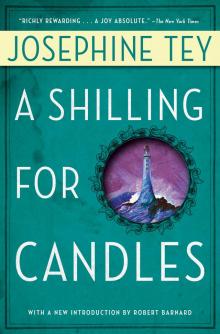 A Shilling for Candles
A Shilling for Candles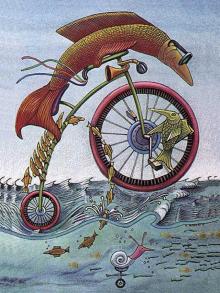 The Singing Sands
The Singing Sands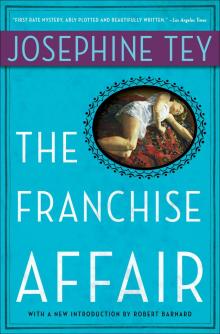 The Franchise Affair
The Franchise Affair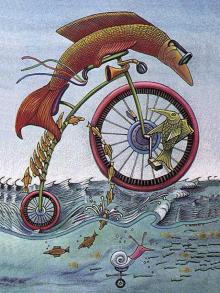 Daughter of Time
Daughter of Time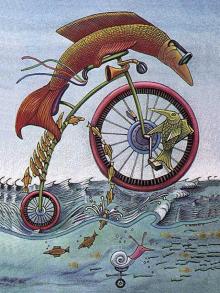 To Love and Be Wise
To Love and Be Wise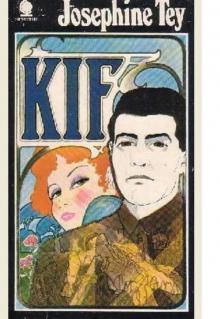 Kif
Kif The Expensive Halo: A Fable Without Moral
The Expensive Halo: A Fable Without Moral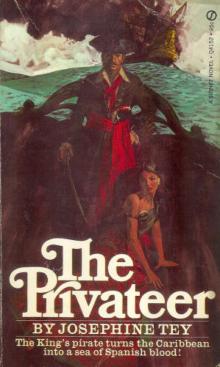 The Privateer
The Privateer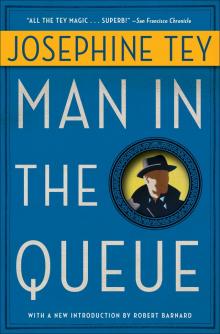 The Man in the Queue
The Man in the Queue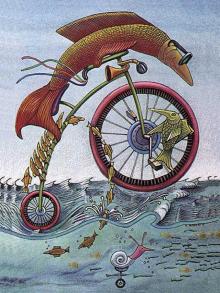 Miss Pym Disposes
Miss Pym Disposes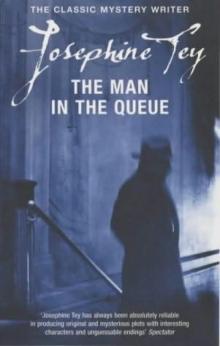 The Man in the Queue ag-1
The Man in the Queue ag-1 Brat Farrar
Brat Farrar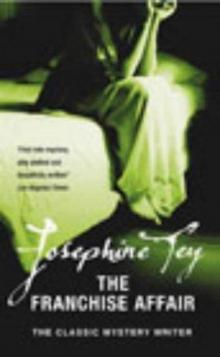 The Franchise Affair ag-3
The Franchise Affair ag-3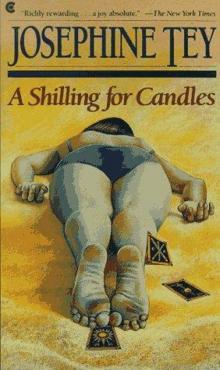 A Shilling for Candles ag-2
A Shilling for Candles ag-2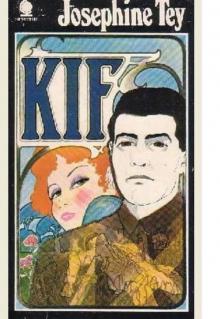 Kif: An Unvarnished History
Kif: An Unvarnished History The Expensive Halo
The Expensive Halo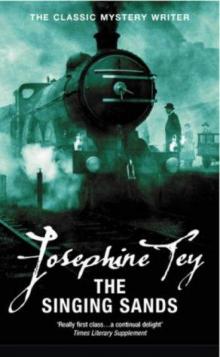 The Singing Sands ag-6
The Singing Sands ag-6 To Love and Be Wise ag-4
To Love and Be Wise ag-4